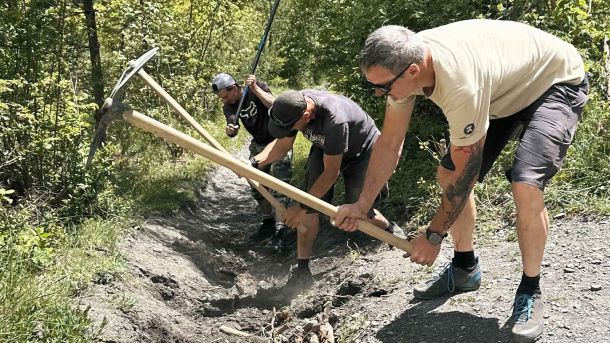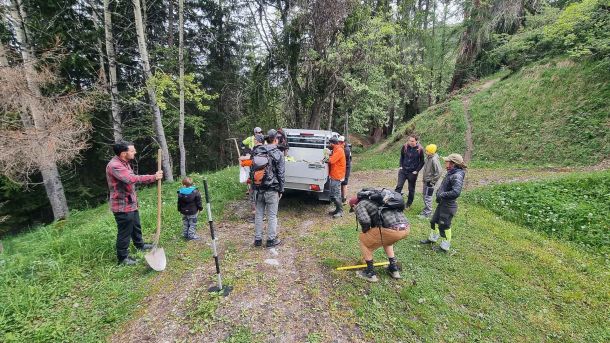ProVTT political actions: Approval process and transparency
⚖️ Mountain biking in Valais: ProVTT is campaigning for greater transparency and quality ⚖️
In Valais, dedicated mountain biking trails are the subject of heated debate. Recently, the ProVTT Valais association, which defends the interests of cyclists in the canton, challenged the cantonal authorities following their initial refusal to release the files relating to the first stages of the "Valais Horizon Bike" project, linking Martigny to Chamoson, via the Portail de Fully and Ovronnaz. This project is currently in pre-consultation, a phase of the approval process deemed internal to the state, according to cantonal services.
Transparency and participation: a legal requirement according to ProVTT
At the heart of the debate is the issue of transparency and the right of associations (stakeholders) to participate from the earliest stages of route planning. ProVTT Valais relies on Article 5 of the Federal Act on Cycle Paths (LVelo), which requires authorities to involve interested individuals and organizations from the very beginning of the plans, and not just when they are submitted for public consultation. According to ProVTT, this federal obligation takes precedence over cantonal regulations, particularly the Leisure Mobility Routes Act (LIML).
The association adds: "It is clear that the federal text requires project leaders to involve interested parties from the very beginning of the route planning phase. As the voice of Valais mountain bikers, ProVTT is one of the stakeholders to be included." ProVTT considers that the canton's current practice of conducting an "internal pre-consultation phase" closed to the public contravenes this federal legal requirement.
A case that reveals political tensions
On March 24, 2025, ProVTT Valais met with representatives of various cantonal authorities (Territorial Development Service, Mobility Service, and Valrando). The discussions were deemed "constructive" by the association, which acknowledges that public stakeholders operate in a complex context, with sometimes hostile sensitivities to the development of mountain biking within cantonal services.
ProVTT, however, highlights a major problem: the absence of a body responsible for "weighing up interests" at the end of the pre-consultation and consultation process. Currently, projects are either unilaterally adapted to meet the specific requirements of cantonal services (SCPF, SEN, SFNP), or they risk being blocked altogether. This situation compromises the final quality of projects and creates numerous practical difficulties for project leaders. As early as 2024, ProVTT appealed to the Valais Grand Council through Bruno Moulin and Nathan Bender: Why not promote a pragmatic approval procedure for mountain bike routes?
The association also noted that feedback from the pre-consultation phase often forces project leaders to reduce the quality of the initially planned routes, sometimes imposing procedures that exceed legal requirements. Concrete examples exist, such as the permanent clearing imposed in Valais for certain mountain bike routes. This issue was also the subject of an appeal to the Grand Council by UDC MP Grégory Logean. Furthermore, some cantonal services are making legally unacceptable demands, such as the addition of mountain bike exclusion zones, increasing unjustified pressure on project leaders and municipalities. ProVTT clearly demands that these unfounded demands be excluded from official approval applications.
Concrete proposals to improve quality
Faced with these challenges, ProVTT is making specific proposals:
- Systematic integration of associations from the pre-consultation stage: ProVTT explicitly requests that stakeholders interested in approval projects be included in the technical guidelines for the approval process. As the spokesperson for Valais mountain bikers, ProVTT believes it has a legitimate role at the cantonal level.
- Creation of a clear evaluation grid: The association demands that the analysis of the quality criteria according to federal law (and in particular Article 4 on technical requirements for piloting) be systematically carried out and formalized in approval applications. Routes on trails or other surfaces must be clearly visible on the maps to facilitate evaluation.
- Prior analysis of route alternatives: ProVTT offers a thorough and systematic evaluation of route alternatives for each route project, with clear justification for the choices made, to avoid unnecessary opposition. If a route is favored over a more attractive alternative, project leaders must explain the reasons.
- Clarification of target audiences: ProVTT requires that approval applications clearly specify the target audience, the level of difficulty of the routes, and clearly explain the specific context of each type of route (local, regional, etc.). Indeed, a regional route (according to the SuisseMobility nomenclature) will be intended for a different audience than a local route and will be subject to more constraints (crossing several municipalities, access to public transport, catering and accommodation options, etc.).
- Development of Regional Master Plans: The association advocates comprehensive planning by region to ensure greater consistency and overall quality of the proposed routes.
Towards a political or legal resolution?
While ProVTT Valais primarily hopes for a constructive response from the cantonal authorities, it also plans to refer the matter to the Valais Grand Council or initiate administrative proceedings if the obstacles persist. The association primarily wishes to avoid open conflict, but firmly reaffirms the need for cantonal authorities to fully respect the federal legal framework.
This mobilization by ProVTT demonstrates the growing importance of mountain biking in the Valais public debate and highlights the crucial legal and political issues related to the participatory governance of tourism and leisure projects.



